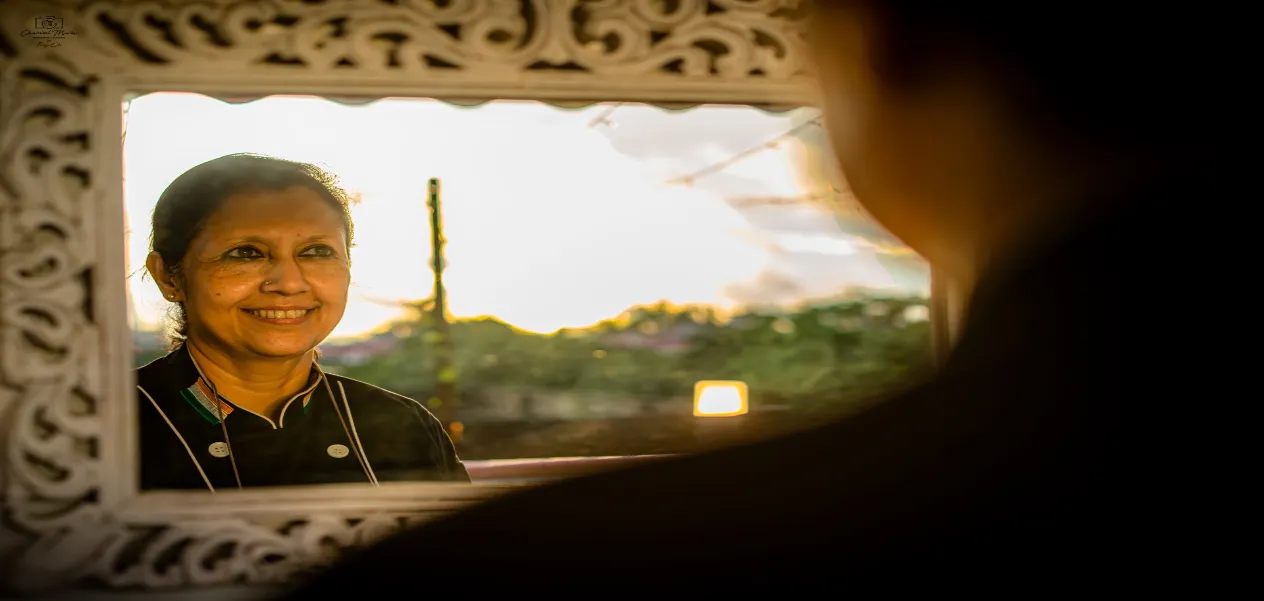
Hena Ahmed / Kolkata (West Bengal)
Manzilat Fatima, the great-great-granddaughter of Nawab Wajid Ali Shah(Awadh's last Nawab) and Hazrat Mahal, is a busy food entreprenuer who has successfully built the legacy and popularised some of the signature Awadhi cuisines in Kolkata.
She began her journey with the sole intention of creating awareness on the history of Muslim food consumed in Kolkata. This cuisine has travelled from Lucknow to Metiabruz (also known as mini-Lucknow here).
Manzilat said "I saw people travelling to Lucknow from Kolkata, especially during the pujas to have the ulta tawa parantha, galawati kebab, biryani, and pulao but no one thought about the connection between the food served here and in Lucknow. Initially, I had no idea how to start. My peers appreciated the food and there were pop-ups every three months in Kolkata, or I would go to other cities. Gradually, by word-of-mouth, the food I cooked and served grew popular, and food enthusiasts enquired about my pop-ups and menus."
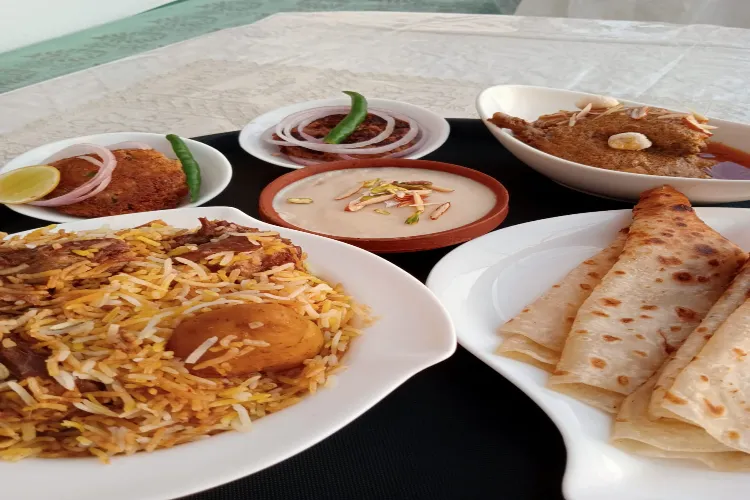
Sumptuous Awadhi cuisine
Although hesitant and drawing the fine line of differences between food cooked at home and food served professionally. Manzilat, next, announced on social media that she would be serving Haleem for the month of Ramazan. Friends, relatives and media encouraged and appreciated her culinary skills, but deep down, she knew, "No matter how much coverage I get if the food is not good, the legacy will not matter."
She gathered confidence after the first year when Ramadaan Haleem became more popular. Some customers requested that they wanted to sit and eat at her place and were willing to use the stairs as Haleem is best served hot. She was touched by the gesture and arranged a table and chairs for them.
So, the fourth-generation Nawab descendant started a food set-up or a small eatery on her terrace in Kasba, Kolkata. The eat Manzilat's displays her photographs and family tree.
The secret to her cooking is simple. She hugely drew inspiration from her mother- "I am cooking what I used to eat," Manzilat affirmed.
The next pop-up was Nawabi Kebabi, where she served three to four types of kebabs- boti kebab, handi kebab, pasanda kebab and galawati kebab, along with parathas. Biryani followed when her restaurateur friends reassured her of buying the biryani if it was not sold.
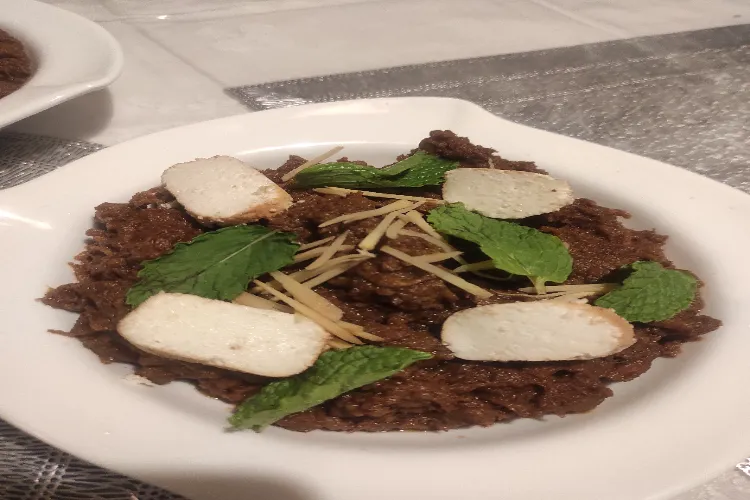
Tender and flavourful Majlisi Pasanda Kabab- The core of Awadhi food
She was skeptical in the beginning and asked herself, "I am not aware of what I would cook, and if the food is not used, what will I do with it."Brushing aside her doubts, she curated 11 dishes in a way exclusive to her kitchen. Manzilat said, "I serve what I eat."
So, three types of biryani can be explored here. The menu was short, with Kebabs, biryani, and beef items. In 2015-16, people were not as sensitive about beef, and she could easily make and deliver it through Swiggy and Zomato, but later, it was removed from the menu.
She elaborated further on the finer details of food served at Manzilat's and why it strikes a chord with passionate food lovers.In 'Ulta tawa parantha, less oil/ghee is used here, and layering is avoided. We cook it as a normal 'rumali' roti. People usually think parantha is heavy and difficult to eat, but the one made here is soft and thin, and most food enthusiasts prefer it over others."
She has successfully included a lot of Awadhi cooking culture and cuisines in Kolkata. Many popular chains (like Aminia) have introduced Galawati kebab, which was not there earlier.Focusing on the varieties served, she acquainted us with the kebab lineage and the difference between Awadhi and Mughlai cuisine.
Manzilat drew connections and also clarified the differences. She stated, "Pasinda kebab, patella kebab, galawati kebab are cousins. All three of them are made in pateli. Mughlai food is from north India, centered in Delhi, while Awadhi food is centered in Awadh, Luckow. They belong to their respective dynasties. In terms of appearance, they both are different. Mughlai is spicy and greasy, and mitha atar or fragrance is used. Awadhi is mild and minimal in spices. Aromatic spices are used, which already have a predominant flavor. Also, Awadh has a lot of kebabs and Pulao, which Mughlai cuisine lacks.
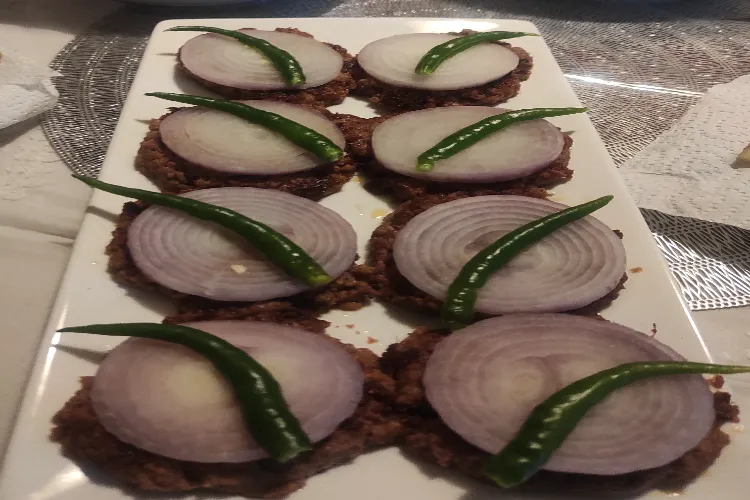
The mouth-watering Galaouti Kebab is no longer undivulged in Kolkata
The evolution of Biryani and its history in Kolkata
According to Manzilat, "Biryanis is the most talked about food in current times. A lot of innovation happened in the Awadhi kitchens. Gastronomy was treated as an art during the time of Wajid Ali Shah and when the Awadh reign was at its peak, food was given a lot of priority. The Nawab's one time meal came from 5-6 kitchens. So, when he came to Metiabruz, he established a small Lucknow. There was only a single kitchen, and lots of experiments were happening; adding potatoes to biryani was a part of it."
In 1857, the potato was considered an exotic vegetable. It has a neutral taste, and when cooked, it can absorb the taste of the curry. In biryani, it was added, and it clicked. Many seem to like it, and after the death of Wajid Ali Shah, when bawarchis or cooks came to Kolkata, biryani became a common food for the city.
She highlighted another context where a different narrative was heard that the Nawab could not afford to feed his people, so potato was added to biryani.
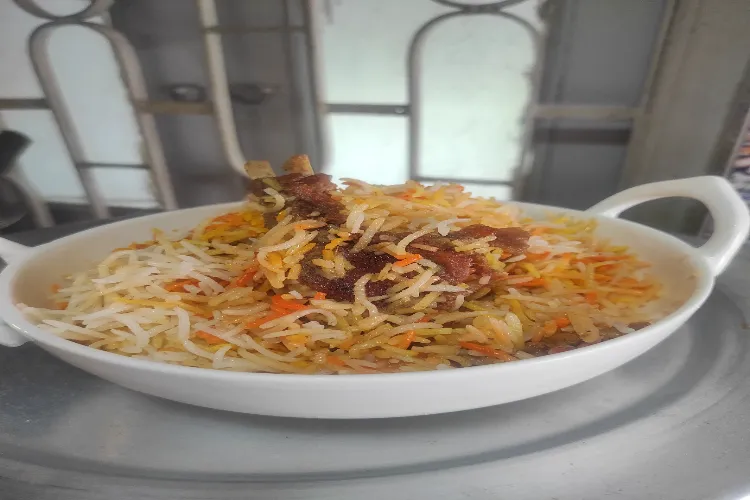
Kalkatta Awadhi Mutton Biryani, straight from the royal's kitchen
Manzilat asserted, "This is relatively absurd because mutton was 50-70 Rs kg in my childhood. So, in those times, it was way cheaper. Mutton wasn't costly then, but potato was an exotic vegetable and costly too. Not all could afford potato except for the royals. Wajid Ali Shah was recreating history here and would not stoop so low. Adding potatoes to add bulk and feed people is purely unacceptable."
Imran Bari Khan, a resident of Kolkata, said, "Eating at Manzilat's is like sitting in the comfort zone of your home. The food served here has a personal touch which prompts me to visit apart from the mouth-watering delicacies."
Manzilat's can accommodate a maximum of 25-30 pax indoors and outdoors for lunch and dinner. Only pre-orders and pre-bookings are accepted.
Speaking on the recent food trends, Manzilat concluded, “Muslim food has largely become a rage in every city. Biryani was the top seller of this year, as per the statistics provided by Swiggy and Zomato.”
(Hena Ahmed is a media consultant)
